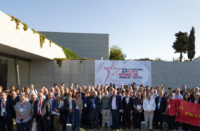Scientists and environmentalists, decades ago, warned the world of an impending global pandemic. Those in the corridors of power who paid no heed to it are now surprised and shocked. Scientists have raised the alarm over a greater catastrophe endangering our very survival on this planet, namely climate change, nuclear war, and artificial intelligence.
All of these are caused, directly or indirectly, by humans. Humans have inhabited this planet for thousands of years; so when we say humans are the cause we mean the exploitative mode of production that humans have developed during the last five hundred years, which cares about nothing except profit.
Covid-19 has exposed the inherent economic crisis, the growing inequality among people, the environmental repercussions of the system based on profit, our unpreparedness to face a global emergency, and the inadequacy of our health services.
How will the post-covid world be? It could move towards a surveillance state, where every movement is scrutinised, on the pretext of controlling pandemics, or towards a more egalitarian system, in which health services and education could be accessible to everyone. Which way it will go depends on the balance of power between the classes.
We have to organise society in a radically different way, one in which use values, such as health, housing, and education, are not put through the exchange value system, accessible only to those who can afford them.
Health is no longer an issue for the individual: it’s a social issue. For you to be healthy your neighbour also has to be healthy, which makes it mandatory to have more public expenditure on health than on the military. Instead of the military it should be an army of doctors—as the Cubans have shown—who should march on foreign lands to help suffering people.
Climate Change
Marx mentions the metabolic rift and says that the capitalist system exploits not only human labour power but also nature, which is the basis of all wealth. John Bellamy Foster says that if world consumption of resources per capita is like the United States, the planet can accommodate only 1.3 billion people (at present 7 billion). The limited resources have to be used economically in an environmentally sustainable way without creating a metabolic rift.
The capitalist system has its own laws of motion. It is based on competition, cost-effective production, and improving productive forces for the maximising of profit. The system encourages freedom of capital and freedom of movement of labour but prevents freedom from exploitation (nature and labour), which will not help in a crisis of the environment and economy. Hence we need to organise the world in a different way, in which resources and benefits in the improvisation of productive forces are shared in a sustainable way.
Socialism v. Barbarism
The transformation of society does not happen naturally in a deterministic way. In her book The Origin of Capitalism, Ellen Meiksins Wood says that European capitalism (in England) is one of the many outcomes of transformation from feudalism. The same feudalism gave rise to absolutism in France.
Similarly the transformation from capitalism to socialism is also not deterministic; as Rosa Luxemburg said, it could be socialism or barbarism. If we, with our theory, won’t organise and intervene to make the change, it can give rise to many undesirable possibilities. With so many countries having nuclear capabilities, it might be the end of civilisation.
Organisation is the bridge between theory and praxis. We have to organise, adhering to Marxist and Leninist principles, to create a progressive society. If we let bourgeois ideology dilute ours through reformist, opportunist or extremist tendencies, capitalism will devour even the present minimal democracy and heave us centuries backwards.
So let us organise on Marxism-Leninism, realise what Marx said, that nature is our “inorganic body,” that we are not apart from nature but a part of it, and so move forward towards a better, humane society.






